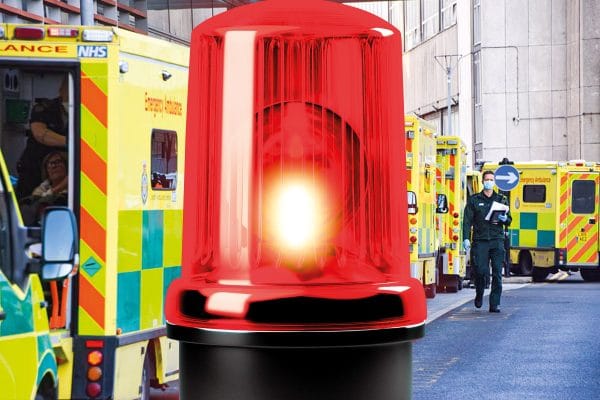Fire doors in schools that won’t shut. Overworked nurses down with sickness. Teachers that can’t afford to teach properly.
All this speaks to the exhaustion of a system that can no longer plan for the future. The bosses, in their desire to cut every corner for bigger and faster profits, inevitably wind up taking a shortcut over a cliff.
The labour leaders, meanwhile, have no faith in the ability of the working class to overturn capitalism and run society themselves. This leads them to even more short-termist solutions.
The recent example of Unite’s general secretary Sharon Graham demonstrates this. She wants Britain’s ‘defence’ budget to be wisely spent on good, skilled, British manufacturing jobs – for the manufacture of the bombs, fighter jets and tanks that support the British imperialism’s interests abroad.
Below, readers of The Communist in various industries give accounts of their experiences of this race to the bottom; the disastrous consequences of the bosses’ shortcuts; and also a critique of the trade union leaders who should be putting up a fight for these industries.
Want to share your experiences from the workplace? Head to communist.red/write!
A day in the life of a building surveyor
As a building surveyor, I understand the findings of the recent phase two Grenfell report all too well.

I once discovered that measurements for drainage in a newly-built housing development – which did not comply with building regulations – were unsafe and illegal. The response was that it ‘did not matter’ and would be ‘buried anyway’.
The party involved was subsequently paid cash-in-hand for a ‘good day’s work’. Disregard for regulations in the pursuit of cost-effectiveness, profit maximization… all this was endemic in the construction of Grenfell.
The phase one report highlighted the importance of compartmentation – the division of rooms into smaller fire-resistant compartments – “[to be] at the heart of safety features”. I have formerly looked through a suspended ceiling and seen 50 metres in each direction, far exceeding the fire safety limits.
Trivial items like refitting fire doors are often neglected. In my reports on schools, I’ve found that eight percent of fire doors fail to close properly. Many of these fire doors only need slight adjustments.
But where are the funds for this work?
I once designed the replacement of 12 timber schoolhouse windows and one external door with aluminum alternatives, to an eye-watering budget of £80,000. This budget primarily benefited the consultancy and a network of middlemen contractors, each extracting their cut.
After labouring for the best part of a decade, the wages I have managed to save for myself do not get near to half the amount of the cost of this project. It is hard to stomach that almost ten years of my youth haven’t been worth 12 windows and a door.
This work is supplied by the indebted, tax-funded local council, currently in the process of selling off assets to stay afloat.
The same contractors have showered me and my colleagues with ‘gifts’ (bribes) in order to ensure future work. When I return from the site with my £100 Christmas hamper, it is a big laugh in the office.
The same office noted wryly that the work to implement amenities for a disabled child had taken so long that the child had now left the school. The child had been at the school from reception.
This is no surprise, considering that out of the £17.5 million the same council was given by the Department for Education for special needs places in schools, only £1.5 million of it was actually spent. This selective exuberance becomes repulsive considering the tight-fisted approach the government has taken to helping Grenfell survivors.
The industry has learned nothing. We await the next Grenfell. Only public control of construction can prevent it.
Code Red in the NHS: Interview with a nurse
Molly Storm, Newcastle
The slow-burn collapse of the NHS is apparent in all of our lives. In July 2023, the waiting list for routine hospital treatment in England grew to nearly 7.7 million. Around 300 people are dying per week as a result of long waits in A&E.

But workers are fighting back. Over the last two years, there have been significant strikes across NHS staff – junior doctors and nursing staff in particular. We interviewed Chris, an NHS nurse and RCN member, who has been involved in the recent nursing strikes.
“Amongst all of the skyrocketing utility bills, food bills, petrol prices,” he explained, “there is a real feeling that it’s just not enough to live on, you know? That people just can’t afford the bare essentials anymore.”
This has contributed to a ‘mass exodus’ of nurses leaving the profession. Between 2018-2022, almost 43,000 people aged 21-50 left the nursing and midwifery professions, alongside a further 27,168 between 2023-24.
Chris explained the mentality of nurses leaving the profession, under immense pressure of overwork and low pay:
“When push comes to shove, people are gonna prioritise their own health. People aren’t naturally going to drive themselves into the ground. They will quit under pressure if they feel that that’s what is going to keep them safe.”
Many nurses and healthcare assistants end up getting sick – physically and mentally – due to the stress of their jobs.
“It’s a downward spiral,” Chris explained to us, when this came up.
“If we can’t afford to look after ourselves and we can’t afford our own food and heating and things, then we get sick. We’re not actually going to be available to look after patients – because we’re all going to be on the sick. We can’t afford to eat, we can’t afford to heat our homes, we’re having to choose one or the other.”
The creeping privatisation of the NHS and subsequent drive for maximum profit is stopping our healthcare system from doing what it is meant to do – providing care and support.
Chris reflected on this, saying: “It really annoys me, because I just don’t understand how people look at the state of the railway, the state of utilities, electricity, gas, water, and think ‘it’s all gone to shit but maybe it’ll fix the NHS’.”
Chris is getting a 5.5% pay increase which, he explained, “In the 20 years, I think, since [Agenda for Change] there’s basically never been an increase in line with inflation. And this 5.5% increase basically takes us back to the same value as our salary would have been in 2004.”
For twenty years, the NHS workers have patiently and politely asked to be paid a wage they can live on, and for twenty years they’ve received scraps. There is only so long that can go on before workers start to demand change.
“The nursing profession and the NHS as a whole”, Chris told us, “we spent two decades asking nicely and just sort of sitting and taking punches in the face and there’s only so long that that can go on for.”
“I think especially with the doctors getting a much better deal, I’m hoping in a personal capacity that that will pave the way for people to start thinking, ‘well if they can do it then maybe we can’. I’ve always been an advocate for ‘take what you’re given, but ask for more’.”
Our government – meanwhile – is sending more and more aid to other countries to fight in wars that further the interests of capitalism.
We’re told that the country doesn’t have money to fund the National Health Service, but our governments have sent £7.8 billion in military support and a further £5 billion in non-military support to Ukraine since 2022.
It is abundantly clear that we must unite and demand better. The Labour government is barely better than the Tories were – a realisation for many that came with little surprise. Together, we can get rid of this stale, corrupt capitalists’ club that only ever has money for bombs and not for books. If we want healthcare not warfare, we need a revolution.
British bombs by British workers?
Ben Cownley, Manchester
Recently, after the government announced an increase in defence spending, Sharon Graham of Unite called for UK jobs to be prioritised. That is, she wants British bombs to be made by British workers, to create good British jobs.

Graham was elected by the rank and file on a militant programme, promising to build a fighting union. But events have shown the limits of unions that focus solely on defending workers’ conditions in the workplace.
Graham’s passive stance towards the UK arms industry is based on most workers within it being organised under Unite. This was the justification for Unite’s stance when the TUC voted for a motion on Palestine. Unite rejected a ban on weapons deals in favour of a modest ban on licenses.
This inability to challenge the arms industry comes from a lack of political understanding, on the one hand. Graham sees the role of unions only as a negotiator at Labour’s table, not a powerhouse that can shut down society.
On the other hand, it comes from a general lack of belief in the working class’ power to change society.
The arms industries could be reequipped to produce useful products with no cost to jobs. We saw the outline of this with the Lucas Plan in the 1970s, when workers themselves drew up a plan to reorganise a factory to produce green technology and medical equipment.
Unite, armed with such a programme, could strike massive blows to the imperialist machine that attacks workers at home and abroad. A militant rank and file deserves a fighting leadership with a revolutionary programme!
Educators get lessons in class struggle: one teachers’ view
Georgie Gibson, Norwich
I’m a trainee teacher at a school in a deprived area, and a member of the RCP.
I quickly found that entering a conversation about politics was not difficult in the staff room. The most radical of the lot are the trainees and learning support assistants.
This is no surprise. Trainee teachers are given a shocking workload, juggling lessons with academic work. In exchange, we are mostly unpaid, living off bursaries (if you’re lucky) and loans. Many trainee teachers use food banks.
Similarly, everyone who’s ever taught a lesson knows the essential role of learning support assistants. Yet they are probably the most exploited layer in the sector.
It is no shock at all that my coworkers are drawing radical conclusions. While Starmer may tweak this part of the curriculum or this assessment criteria, the days of crisis in education are far from over. Such conditions reflect a whole system in decay – a system he defends.
This is why my coworkers are buying The Communist and telling me that they hope their students will grow up to be ‘little Che Guevaras’.
As a teacher, you see the crisis of capitalism everyday, from crumbling schools to hungry kids. It’s sickening. No wonder many of the teachers I’m meeting want to see nothing less than a communist future!






